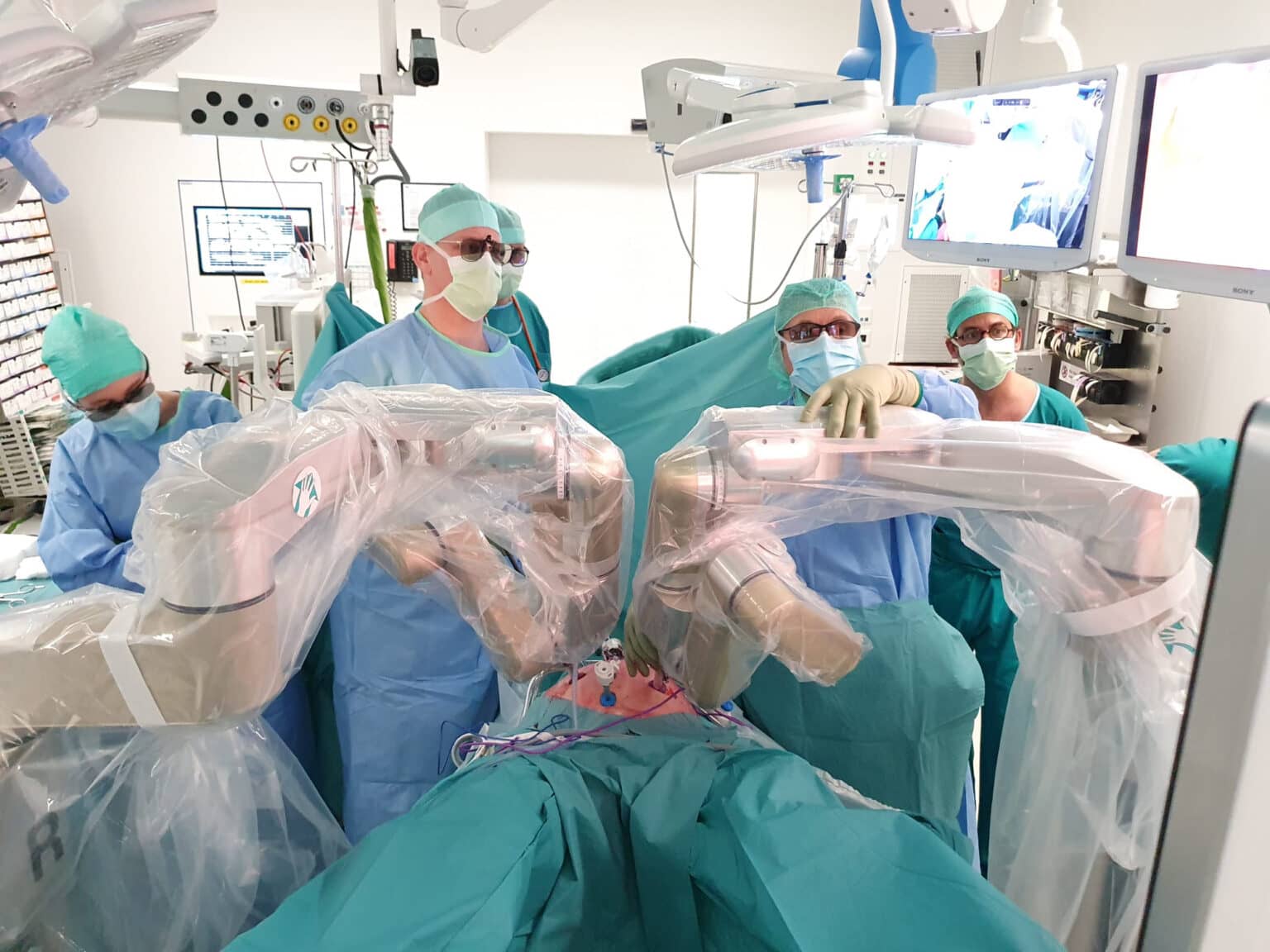19.07
2021
Pioneering Hybrid Robotics in General Surgery at the CHUV
Surgeons at Lausanne University Hospital (CHUV) perform the world’s first hybrid robotic general surgery. Distalmotion and CHUV announce the launch of a clinical study. The CHUV’s Division for Visceral Surgery is at the forefront of establishing a new standard of patient care, and will become a global reference center for hybrid robotic surgery with Dexter.
Distalmotion and Lausanne University Hospital (CHUV) announced today the successful start to a case series using Distalmotion’s surgical robot, Dexter. Prof. Dieter Hahnloser, PD Dr. Fabian Grass and their team at the CHUV were able to carry out the world’s first hybrid robotic colorectal procedure without complications. Said first procedure was a rectopexy. This marks Dexter’s first clinical use in general surgery.
Distalmotion and CHUV also announced the launch of a clinical study. The Division for Visceral Surgery at CHUV, run by Prof. Nicolas Demartines, Chair of the Department of Surgery, will study and evaluate Dexter’s clinical benefits in colorectal surgery, and also provide input in the development of procedure guidelines and training protocols for hybrid robotic surgery with Dexter. The CHUV is thereby set to become a global reference center for hybrid robotic surgery.
Together with select other European institutions, the CHUV has long been the cradle of hybrid robotic surgery. From early concepts and prototypes, to first clinical use and ensuing clinical studies, Prof. Hahnloser and PD Dr. Grass were among the world-leading surgeons to provide key input in the development of Dexter.
Robotics in minimally invasive care: A new approach, a new era
The traditional (non-hybrid) approach to surgical robotics forces surgeons to choose between manual laparoscopy and robotics – forcing them to weigh a trade-off in minimizing the perceived downsides of foregoing either technique. Dexter corrects this false dichotomy. Dexter surgeons can choose freely which steps of a procedure they carry out laparoscopically, and for which steps to employ robotic aid, thus maximizing the benefits of each technique.
Commenting on how the longstanding collaboration with Distalmotion culminated in Dexter’s first clinical case series, Prof. Hahnloser said: “We have come full circle, from the validation of Dexter’s hybrid approach through countless test-runs, to launching a clinical study where the first procedure was carried out without complications and with the desired patient outcomes.”
PD Dr. Grass adds: “The hybrid approach overcomes prior constraints and allows us to leverage the best of both techniques: laparoscopy and robotics. With this approach minimally invasive surgery may become more broadly accessible in our field.”
Prof. Hahnloser concludes: “This is a paradigm shift in how we approach robotic surgery. The hybrid approach means surgeons remain sterile throughout the course of an operation, thus bringing them back into the sterile field, with direct access to their patients and teams. This also optimizes teamwork dynamics and unlocks new training opportunities in the OR.” The Chair of Surgery, Prof. Demartines added: “It’s the role of academic centers to scientifically assess the benefits of new surgical tools and techniques, and I am happy that our team fulfills this objective very well.”
Looking forward to the continuation of the case series that will amass more clinical evidence and help standardize Dexter procedure protocols, Michael Friedrich, CEO of Distalmotion, reflects: “If you focus on leveraging robotic aid where it makes most sense, then a versatile, hybrid model like Dexter will go a long way in making surgeons’ lives easier and ultimately produce better patient outcomes. The first Dexter procedures confirm this and we look forward to further demonstrating and standardizing hybrid robotic surgery through the ensuing clinical study.”
Read full press release
